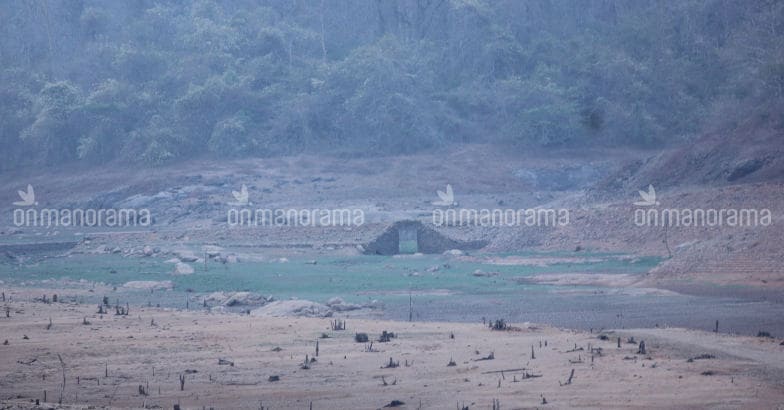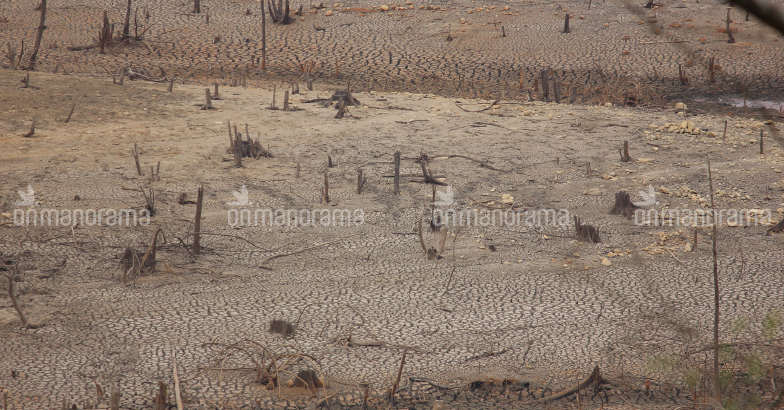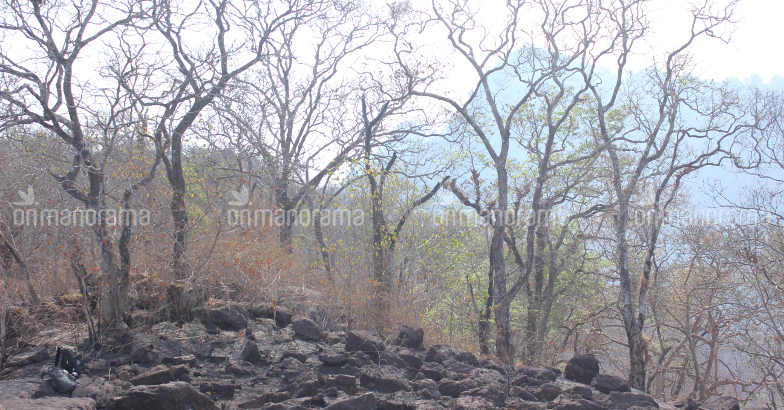When burnt birds and forest fire greeted six hikers at Chimmony

Mail This Article
The woods are lovely, dark and deep, but dangerously creepy too; perhaps, Robert Frost was too busy romanticizing wilderness that he forgot to add that bit.
While choosing Chimmony forest range in Thrissur for our camping trip, all that we wanted was a brief escape from our humdrum existence. But what the six of us got instead was backlash and fury.
A summer in the woods is the most disheartening visual you can ever have: a jungle ravaged by drought and forest fire, half-burnt reeds marking territories of dried water bodies and shallow ditches of silted up ponds. Chimmony was truly a picture of agony.
The trekking camp was down in the valley of Chimmony hills, beside the earth dam. It was just half way through April, but the reservoir had almost dried upand we could easily walk through the bed. The thorny reeds punctured our feetfrom time to time and we stumbled on almost all mud blocks. The large, patterned cracks extended to the farthest of our sight. Eagles, squirrels and other birds flocked near a water-body, forgetting the predator-prey rules.

We started our trek by seven in the morning. After plodding through the valley for half a kilometer, we entered the foothill, which is covered with rubber plantation. Rubber trees spread branches over our heads like an effective shield from sun. But their fallen leaves made the ground slippery, making our stepsloud and noisy.
Up the plantation, starts the forest range. We passed through several camera traps and barbed electric fences. Apparently, leopards and panthers are regularly caught by the surveillance camera during summer as there aren’t any active water-springs up the hill. Elephants herds would stray into human settlements during night to quench their thirst. The trek trail was dry and dusty. Flying lizards, camouflaged on dry tree barks, peeped out to glance at the unfamiliar beings. Figs balanced their berry-rich branches and cacti bore flowers. Steeps slopes were awaiting us in less than a kilometer.
Bamboo clusters lined the slopes making the trek path slippery. The pile of dry bamboo leaves was too thick that we had to laboriously pull out our legs aftereach step ahead. A few of us rumbled down on hidden tree roots and stones, earning scars, blood-clots and swellings all over the body. We were careful not to drink too much water, or eat anything other than a couple of cookies. The brownish nature slowly transformed into dark green and we could hear the sounds of horn-bills and giant squirrels closer. We rested on logs and rocks in between and took two-minute breaks once in a while.

Quite unexpectedly, a wild boar gave us a sudden appearance while rushing down the hill. The long sticks we used for support might have scared the boar as it disappeared in a wink. Just then, a large flock of forest birds flewabove our head. We could hear trumpets moving around. Suddenly, smoke rose from the hilltop far above. Forest fire! All of us felt stranded and helpless amid the burning woods. The dry leaves on ground and the thorny bushes embraced the flames very soon. Halting for long does no good than harm. We decided to move forward and not drop our journey halfway.
We did our best to put off the fire, by beating it with bunches of green twigs and making gaps between the dry leaves on ground. It was a deadly creeping fire, which could raze everything in the forest. Trees collapsed and tall flames swallowed the bamboos. We took deep steps in hot ashes and got burns afterstepping on hot rocks. Fear and tiredness pulled us back in each step. We could hear the loud footsteps of elephants descending the hill in hurry. Several nests collapsed on ground and broken eggs shouted out the gravity of a forest's loss in a fire outbreak. Fire was descending the hill too. Ashes and soot particles in the air blinded us and made us sneeze for long. As we covered half a kilometer more, we could see a hapless picture of the ravaged forest. Fuming logs and burnt shrubs depressed our souls. We walked past the fire and reached a cliff, which offered a perfect viewpoint within the forest.

Far above was a huge rock, which was pretty much the tip of Poomala. The open hilltop was lined with figs and blossoming herbs. The air smelled of Mimusops blossoms and soot from the hillside. The wind was cool. Down the valley, everything, even the half-dried reservoir and the cloudy hills beyond, seemed as if it were portrayed in a helecam footage. After relishing the food we carried and taking ample rest in shades, we started our trek downhill, this time through the other side of the hill.
The path was steep and less sloppy this time around. We passed through leopards' territories: the smell of which closely resembled with that of a petkitten. Ignoring numerous calls and scary growls, we climbed down the hill, stumbling on tree-roots and falling down very often. As we passed the fire-struck region, we saw mother-squirrels and birds searching for their offspringin collapsed nests. The road seemed longer on return and our water bottles had dried out long back.
Our legs were swollen by the time we reached the base camp. I don't remember how I slipped off to sleep when I sat down on my bed to remove my stockings. When I woke up after almost five hours, all what we experienced seemed like a nightmare or rather an adventure movie we watched together.

